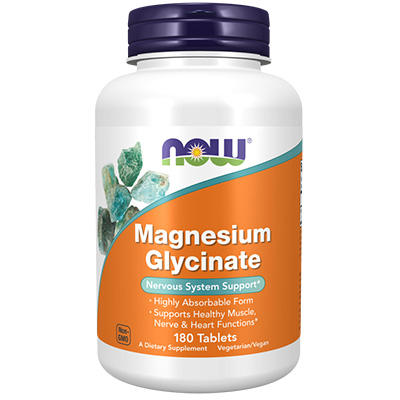Magnesium is a vital mineral that plays a crucial role in maintaining overall health. It is the fourth most abundant mineral in the body and is necessary for the proper functioning of various bodily systems. One of the key areas where magnesium has a significant impact is in muscle function. It helps regulate muscle contractions and relaxations, making it essential for athletic performance and overall mobility.
Magnesium also has a profound effect on heart health. It helps lower blood pressure, reduce the risk of heart disease, and prevent irregular heartbeats. This is because magnesium helps regulate the heartbeat and ensures that the heart functions properly. Additionally, magnesium has been shown to reduce the risk of stroke, heart attack, and other cardiovascular conditions.
The benefits of magnesium can be seen in various aspects of health, including:
- Energy production: Magnesium helps convert food into energy, reducing fatigue and improving overall energy levels
- Bone health: Magnesium helps regulate bone mineralization, reducing the risk of osteoporosis and fractures
- Nervous system function: Magnesium helps regulate nerve function, reducing the risk of anxiety, depression, and other neurological disorders
- Immune system function: Magnesium helps regulate the immune system, reducing the risk of infections and diseases
In terms of muscle function, magnesium helps reduce muscle cramps, spasms, and soreness. It also improves muscle strength, endurance, and flexibility, making it essential for athletes and individuals who engage in regular physical activity. Furthermore, magnesium helps regulate electrolyte balance, which is critical for maintaining proper muscle function.
Overall, magnesium is a vital mineral that plays a critical role in maintaining overall health. Its benefits for muscle function and heart health make it an essential nutrient that should be included in a healthy diet. By ensuring adequate magnesium intake, individuals can reduce the risk of various health conditions and maintain optimal overall health.

What is Magnesium and Its Role in the Body
Magnesium is an essential mineral that plays a crucial role in various bodily functions. It is the fourth most abundant mineral in the human body and is necessary for maintaining good health. Magnesium is involved in over 300 biochemical reactions, including energy production, nerve function, and muscle contraction.
The biological importance of magnesium cannot be overstated. It helps to regulate blood pressure, supports bone health, and is necessary for the proper functioning of the immune system. Magnesium also has anti-inflammatory properties, which can help to reduce the risk of chronic diseases such as heart disease and diabetes.
The daily recommended intake of magnesium varies based on age and sex. Generally, adult men need around 400-420 milligrams of magnesium per day, while adult women need around 310-320 milligrams per day. Pregnant women need more magnesium, around 350-360 milligrams per day. The recommended intake can be achieved through a balanced diet that includes magnesium-rich foods such as dark leafy greens, nuts, and whole grains.
Common sources of magnesium include:
- Dark leafy greens such as spinach and kale
- Nuts and seeds such as almonds and pumpkin seeds
- Whole grains such as brown rice and quinoa
- Legumes such as black beans and chickpeas
- Fatty fish such as salmon and mackerel
Despite the availability of magnesium-rich foods, many people do not get enough magnesium in their diet. This can lead to magnesium deficiency, which can cause a range of symptoms including fatigue, muscle cramps, and weakness.
Magnesium deficiency is relatively common, especially among certain groups of people. Older adults, people with gastrointestinal disorders, and those who take certain medications such as proton pump inhibitors are at a higher risk of magnesium deficiency. Additionally, people who consume a lot of processed and sugary foods may not get enough magnesium in their diet, as these foods are often low in essential nutrients.

Top 5 Magnesium Supplements
When it comes to choosing the right magnesium supplement, there are numerous options available in the market. With so many choices, it can be overwhelming to decide which one is the best for your needs. To help you make an informed decision, we have compiled a list of the top 5 magnesium supplements available.
These supplements have been selected based on their unique features, benefits, and customer reviews. Here are the top 5 magnesium supplements:
- Magtein: This supplement features a unique blend of magnesium and other essential nutrients that support brain health and cognitive function.
- Garden of Life Magnesium: This supplement is made from whole foods and features a blend of magnesium and other essential nutrients that support overall health and wellness.
- Nature's Bounty Magnesium: This supplement is designed to support bone health and features a blend of magnesium and other essential nutrients that support overall health and wellness.
- Jarrow Formulas Magnesium: This supplement features a unique blend of magnesium and other essential nutrients that support heart health and energy production.
- Doctor's Best Magnesium: This supplement is designed to support overall health and wellness and features a blend of magnesium and other essential nutrients that support bone health and energy production.
Each of these supplements has its unique features and benefits. For example, Magtein is designed to support brain health, while Garden of Life Magnesium is made from whole foods. Nature's Bounty Magnesium is designed to support bone health, while Jarrow Formulas Magnesium supports heart health and energy production. Doctor's Best Magnesium, on the other hand, supports overall health and wellness.
In terms of benefits, these supplements can help to support overall health and wellness, including bone health, heart health, and energy production. They can also help to support cognitive function and brain health. Additionally, they can help to alleviate symptoms of magnesium deficiency, such as muscle cramps, fatigue, and anxiety.
Overall, these top 5 magnesium supplements are a great option for anyone looking to support their overall health and wellness. By choosing the right supplement, you can help to ensure that you are getting the nutrients you need to support your health and wellbeing.

Benefits of Magnesium for Muscle Function and Heart Health
Magnesium plays a crucial role in maintaining optimal muscle function. One of the primary benefits of magnesium is its ability to reduce muscle cramps and spasms. This is especially important for athletes and individuals who engage in regular physical activity, as muscle cramps can be a major hindrance to performance. Magnesium helps to regulate muscle contraction and relaxation, reducing the likelihood of cramps and spasms.
In addition to reducing cramps and spasms, magnesium also helps to improve muscle function by increasing energy production and reducing fatigue. This is because magnesium is involved in the production of ATP, the energy currency of the body. When magnesium levels are adequate, muscles are able to function more efficiently, leading to improved overall performance. Some of the key ways that magnesium improves muscle function include:
- Regulating muscle contraction and relaxation
- Reducing muscle cramps and spasms
- Increasing energy production
- Reducing fatigue
Magnesium is also essential for maintaining heart health. One of the primary ways that magnesium supports heart health is by regulating blood pressure. Magnesium helps to relax blood vessels, reducing blood pressure and the risk of cardiovascular disease. This is especially important for individuals who are at risk of developing high blood pressure, as it can help to prevent the development of this condition. Some of the key ways that magnesium supports heart health include:
- Regulating blood pressure
- Reducing the risk of cardiovascular disease
- Preventing the development of high blood pressure
- Improving overall cardiovascular function
Overall, magnesium is a crucial nutrient that plays a vital role in maintaining optimal muscle function and heart health. By ensuring adequate magnesium intake, individuals can reduce their risk of muscle cramps and spasms, improve their overall muscle function, and support their heart health. This can be achieved through a combination of dietary changes and supplements, and can have a significant impact on overall health and wellbeing.

How to Choose the Right Magnesium Supplement
When it comes to choosing a magnesium supplement, there are several factors to consider. The first step is to determine the right form of magnesium for your needs. Magnesium comes in various forms, including magnesium oxide, magnesium citrate, and magnesium glycinate. Each form has its own unique benefits and absorption rates.
To select a high-quality magnesium supplement, consider the dosage. The recommended daily intake of magnesium varies from 400 to 420 milligrams per day for adults. However, some individuals may require higher or lower doses depending on their specific needs. It is essential to consult with a healthcare professional to determine the right dosage for your individual needs.
Some key factors to consider when choosing a magnesium supplement include:
- Form: As mentioned earlier, magnesium comes in various forms, each with its own benefits and absorption rates.
- Dosage: The recommended daily intake of magnesium varies, and it is crucial to determine the right dosage for your individual needs.
- Brand reputation: Look for a reputable brand that adheres to good manufacturing practices and has a history of producing high-quality supplements.
- Third-party testing: Choose a supplement that has been tested by a third-party organization to ensure purity and potency.
- Label claims: Be wary of supplements that make exaggerated label claims, and instead, opt for a supplement with realistic and scientifically-backed claims.
In addition to these factors, it is also essential to consider any potential interactions with medications or other supplements. Certain medications, such as blood thinners, may interact with magnesium supplements, and it is crucial to consult with a healthcare professional before taking any new supplement. By considering these factors and doing your research, you can choose a high-quality magnesium supplement that meets your individual needs and helps you achieve optimal health.

Frequently Asked Questions (FAQ)
What are the symptoms of magnesium deficiency?
Magnesium is an essential mineral that plays a crucial role in various bodily functions, including energy production, nerve function, and muscle contraction. A deficiency in magnesium can lead to a range of symptoms, which can vary in severity and impact daily life.
One of the most common symptoms of magnesium deficiency is fatigue. This can manifest as a general feeling of tiredness, lethargy, and lack of energy, making it difficult to perform daily tasks and activities.
Another symptom is weakness, which can affect the muscles and lead to a lack of mobility and flexibility. This can be particularly noticeable in the arms and legs, making it difficult to perform physical activities.
Muscle cramps are also a common symptom of magnesium deficiency. These can be painful and debilitating, and can occur in various parts of the body, including the legs, feet, and hands.
Some other symptoms of magnesium deficiency include:
- numbness or tingling sensations in the hands and feet
- irregular heartbeat and palpitations
- anxiety and depression
- insomnia and sleep disorders
- digestive problems, such as constipation and bloating
It is essential to recognize these symptoms and seek medical attention if they persist or worsen over time. A healthcare professional can diagnose magnesium deficiency through blood tests and other diagnostic procedures, and recommend appropriate treatment to alleviate symptoms and restore magnesium levels.
Can I get enough magnesium from food alone?
Magnesium is an essential mineral that plays a crucial role in various bodily functions, including muscle and nerve function, heart rhythm, and bone health. While it is possible to get some magnesium from food sources, many people struggle to get enough from their diet alone.
There are several food sources that are rich in magnesium, including dark leafy greens, nuts, and whole grains. Some examples of magnesium-rich foods include spinach, almonds, and brown rice. However, the amount of magnesium in these foods can vary depending on factors such as the soil quality and cooking method.
For those looking to increase their magnesium intake through food, here are some of the richest sources:
- Dark leafy greens like spinach and kale
- Nuts and seeds, such as almonds and pumpkin seeds
- Whole grains like brown rice and quinoa
- Fish, particularly mackerel and salmon
- Legumes, including black beans and chickpeas
Despite the availability of these food sources, many people still struggle to get enough magnesium in their diet. This can be due to a variety of factors, including a busy lifestyle, limited access to fresh produce, and certain medical conditions. In these cases, supplements can help ensure adequate intake of magnesium. Supplements can provide a concentrated dose of magnesium, making it easier to meet daily needs. Additionally, supplements can be especially helpful for individuals with certain medical conditions or those taking certain medications that may interfere with magnesium absorption.
Are magnesium supplements safe for everyone?
When considering magnesium supplements, it is essential to examine the potential risks and interactions associated with their use. While magnesium is a crucial mineral for overall health, its supplementation may not be suitable for everyone. Individuals with certain health conditions or those taking specific medications should exercise caution when using magnesium supplements.
Magnesium can interact with various medications, including antibiotics, blood thinners, and diabetes medications. For instance, magnesium can decrease the absorption of antibiotics, reducing their effectiveness. Additionally, magnesium can enhance the effects of blood thinners, increasing the risk of bleeding. Individuals taking these medications should consult their healthcare provider before using magnesium supplements.
Certain health conditions also require precautions when taking magnesium supplements. Individuals with kidney problems, for example, may need to limit their magnesium intake, as their kidneys may have difficulty removing excess magnesium from the body.
- Kidney disease: Magnesium can accumulate in the body and worsen kidney function.
- Heart block: Magnesium can slow down heart rate, exacerbating heart block conditions.
- Gastrointestinal issues: Magnesium can cause stomach upset, diarrhea, and interact with gut medications.
To ensure safe use, individuals should consult their healthcare provider before taking magnesium supplements, especially if they have any underlying health conditions or take medications. A healthcare provider can help determine the appropriate dosage and monitor potential interactions. By taking the necessary precautions, individuals can enjoy the benefits of magnesium supplements while minimizing the risks.
It is also crucial to choose a high-quality magnesium supplement from a reputable manufacturer to minimize the risk of adverse effects. Look for products that have been tested by third-party organizations and adhere to good manufacturing practices. By being informed and cautious, individuals can safely incorporate magnesium supplements into their health regimen.





